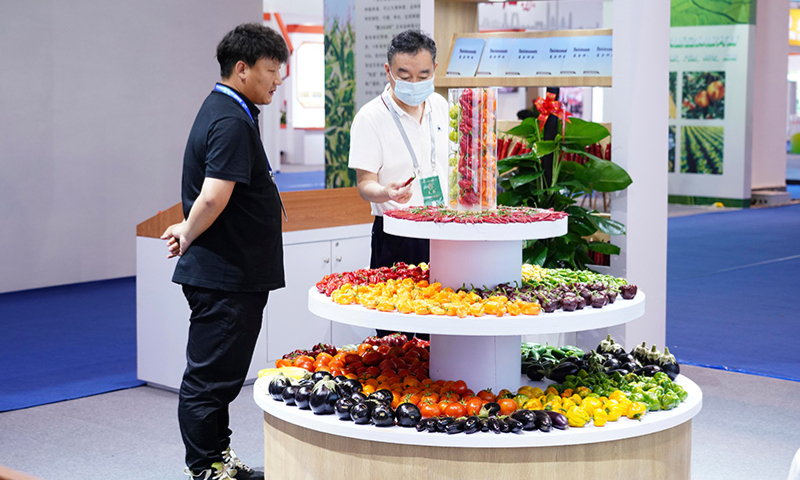
Photo taken on April 2, 2023 shows the exhibition of the 2023 China Seed Congress and Nanfan Agricultural Silicon Valley Forum held in Sanya, South China's Hainan Province. Photo: Xinhua
Top Chinese agricultural scientists have warned against food security risks for the country due to a number of factors, including growing domestic demand and over-reliance on imports amid global uncertainties, while vowing to make breakthroughs in studying and finding better crop seeds that can increase output and quality.
At the ongoing China Seed Congress (CSC) and Nanfan Agricultural Silicon Valley Forum in Sanya, South China's Hainan Province, officials, top experts and industry players said that while China is still lagging behind the US and other advanced economies in terms of research and development (R&D) for crop seeds, the country has also made strides in building up its R&D infrastructure and capabilities in recent years.
"Our country's agricultural science and technology innovation as a whole has risen to be among the world's leading group of countries. We pay great attention to the sci-tech innovation of the seed industry, which has entered the fast lane," Wu Zhaohui, a vice minister of science and technology, said at the CSC.
Still, Wu was quick to point to the great pressure and risks related to the country's food security, citing "uncertainties in global agricultural production and the trade structure, growing domestic demand and limited water and land resources, as well as changing technologies."
Ensuring food security has become a top priority for China, as many factors, including geopolitical tensions and natural disasters, have exacerbated the risks of over-reliance on imported food, which has prompted measures to bolster domestic output to achieve self-sufficiency.
In terms of grain supply, China's self-sufficiency ratio is 83 percent, which is well below the standard of 95 percent needed to ensure domestic food security, Li Jiayang, a renowned agricultural scientist at the Chinese Academy of Sciences (CAS), said at the CSC.
"China is a heavily populous country, and relying on the international markets for food supplies is more difficult and more dangerous," Chen Mengshan, head of the State Food and Nutrition Consultant Committee, said, while pointing to the tide of anti-globalization, rising trade protectionism and geopolitical conflicts. "Uncertainty in global food trade has significantly intensified."
Facing such risks, the top scientists called for robust R&D in crop seeds, which are often called the microchips of the agricultural sector, to boost domestic output and increase self-reliance. Vitalizing the seed industry, particularly R&D in high-yield, high-quality seeds, has become a focal point of China's ramped-up effort to boost food self-sufficiency.
In recent years, China has introduced policies to boost R&D in crop seeds, and top policy documents repeatedly emphasized development in the seed industry. This year, both the No.1 central document and the Government Work Report stressed the need to invigorate the seed industry and strive to make key technological breakthroughs in agriculture.
China's efforts in seed R&D are fully reflected in the rapid rise of the Yazhou Bay Seed Laboratory in Sanya, where teams from top research institutions and companies across the nation have come together to study a long list of crop seeds. As of the end of 2022, the lab had 22 research teams led by top CAS scientists, and it had attracted more than 120 postdoctoral fellows and over 900 graduate students.
The mission of the lab is to focus on "meeting current pressing needs and seizing future high ground" in terms of seed R&D, said Li, who is also leading the lab, adding that the lab is aiming for major breakthroughs in original and disruptive agricultural biology theories and building a new technology system for seedlings with independent intellectual property rights.
The lab is located in the Nanfan Silicon Valley in Sanya, a major base for China's seed R&D that contributes to more than 70 percent of the country's new agricultural seeds. Thanks to its rapid expansion, the base and its seed R&D ecosystem have attracted many businesses from across the country to conduct their own research.
At the forum in Sanya, many firms highlighted their progress in finding high-quality seeds and catching up with global industry leaders.
"Investing in R&D is very costly, but without R&D, a company is doomed to fail," Liu Hui, an executive of the seed unit under the Beidahuang Group, a Chinese agricultural conglomerate, told the Global Times.
Liu said that the company has fully formed its R&D platform, which is aimed to be on par with that of Monsanto, but it faces challenges such as lack of sufficient data and talent. "There has to be a process of cumulation," he said.




